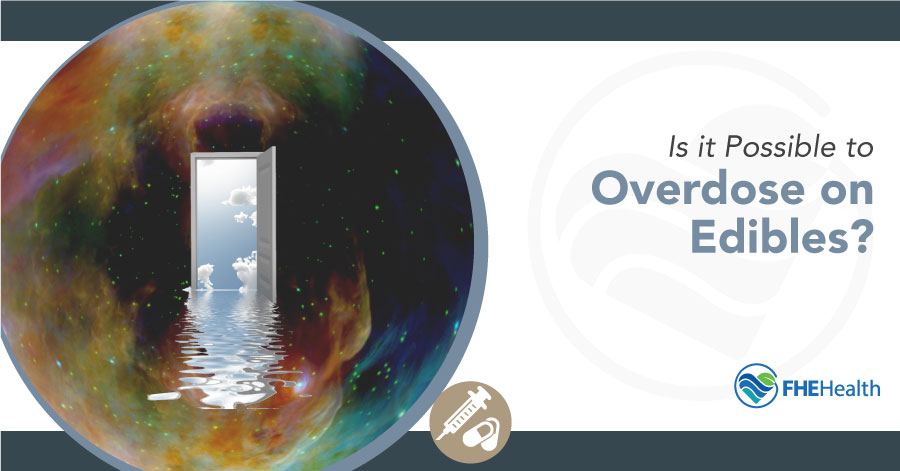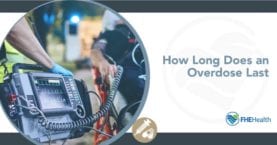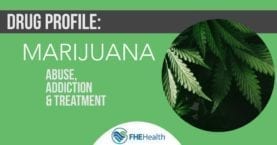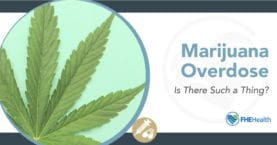
For many people, especially regular users, the notion that you can overdose on marijuana seems far-fetched. The THC found in marijuana doesn’t typically present the same level of physical harm as drugs such as heroin, methamphetamines, and cocaine do. But what about gummies, brownies, capsules, and other types of consumable products (edibles) containing THC? Can you overdose on edibles?
There’s some truth to the idea that overdose isn’t a serious concern with marijuana. Around half of Americans have tried marijuana, largely without incident, and as of 2024, 24 states and two territories allow for legal use of recreational marijuana. However, all drugs, including legal ones, have the potential for abuse. Alcohol, for instance, is legal but can result in significant health issues, including overdose. The same is true for edibles containing THC.
Despite widespread medical and growing recreational legalization, the use of marijuana poses some risks. Taking edibles often leads to a different kind of high than smoking, which can lead new and even experienced users to become confused or disoriented by the sensation.
What Are Edibles?
The term edible refers to any marijuana product that’s ingested orally rather than through any other means. This generally requires baking or cooking with marijuana to make products such as pot brownies, a common form of ingestible marijuana using pot-infused butter as a base.
Edibles used to be a largely DIY endeavor, but as both medical and recreational dispensaries are expanding across the country, it’s now possible to buy premade edibles of all kinds, such as baked goods and candies. For those who don’t want to smoke marijuana but still want to feel the effects, edibles can be a convenient solution.
Edibles are no more or less addictive than any other form of marijuana, and they’re not dangerous when ingested safely and responsibly. However, no drug is safe all the time, and responsible use is paramount to reduce the chances of an overdose of edibles.
What is the Difference Between Taking Edibles and Smoking?
Those not used to eating marijuana may be surprised at the contrasts between smoking and edibles. If you’re expecting the same effects as smoking, it’s not uncommon to become overwhelmed by the sensation. Edibles can take longer to kick in than smoking, so users may consume more products in search of a high, resulting in stronger symptoms. For those not prepared for the difference in sensation, panic or paranoia can result.
When someone smokes marijuana, THC enters the lungs and then the bloodstream within a matter of seconds. Peak effects usually occur within 30 minutes and can last for around 6 hours.
Edibles, however, must be absorbed through the stomach and thus don’t take effect for 30 minutes to 2 hours after ingestion. Effects last longer, too; the peak occurs after around 4 hours, and side effects can last as long as 12 hours.
The sensation a user feels when consuming edibles can be stronger than with smoking, which is why edibles can be preferable for those with pain from medical issues like cancer. This phenomenon occurs because when you consume THC orally, the liver processes the THC and converts it to a more potent form known as 11-hydroxy THC. This form is more intoxicating to the centers of the brain that cause the feeling of being high.
Can You Overdose on Edibles?
An overdose refers to the consumption of any substance in an amount that exceeds safe limits. With some drugs, an overdose can lead to feeling nauseated, dizzy, disoriented, or fatigued. However, in others, such as heroin, an overdose can quickly prove fatal.
In the case of marijuana, a true overdose is uncommon. Per the CDC, it borders on impossible, leading many to feel there’s no limit to how much marijuana a person can ingest. Unfortunately, this can be a dangerous mindset, regardless of the substance in question. Even though a high dose may not slow heart rate and breathing to the point of death, it can still be an unpleasant experience.
When consuming marijuana in any amount, whether smoking it or via edibles, it’s important to know your tolerance and level of consumption. And if taking increasing amounts to seek more of a high is a consistent part of marijuana use or using marijuana interferes with normal life, seeking help may be the best course of action.
An overdose of edibles, although uncommon, may occur when a person consumes an edible and doesn’t wait a sufficient amount of time to feel the THC effects. This leads to the person consuming another edible, potentially consuming too much for their level of tolerance.
Packaging of edibles, even commercially prepared products, can be confusing to the consumer, and this potentially raises the risk of an overdose on edibles. For example, candy that has 5mg of THC per serving may be divided into squares of one square per serving. A user who assumes the entire package is a single serving may inadvertently consume the whole thing, resulting in THC overdose.
What Are The Side Effects of Edibles and High Levels of THC?
Overdosing on marijuana to a fatal degree is virtually not possible, including an overdose on edibles, but excessive amounts can still contribute to negative effects. Some common symptoms and signs of THC or edible overdose include:
- Extreme anxiety, including panic attacks and paranoia that can result in erratic behavior
- Hallucinations
- Psychotic thought patterns
- High blood pressure and a rapid heart rate
- Problems with motor function and coordination
- Severe lack of judgment
Those using edibles for the first time should take small doses to start and wait at least 2 hours for the impact to set in before taking more.










